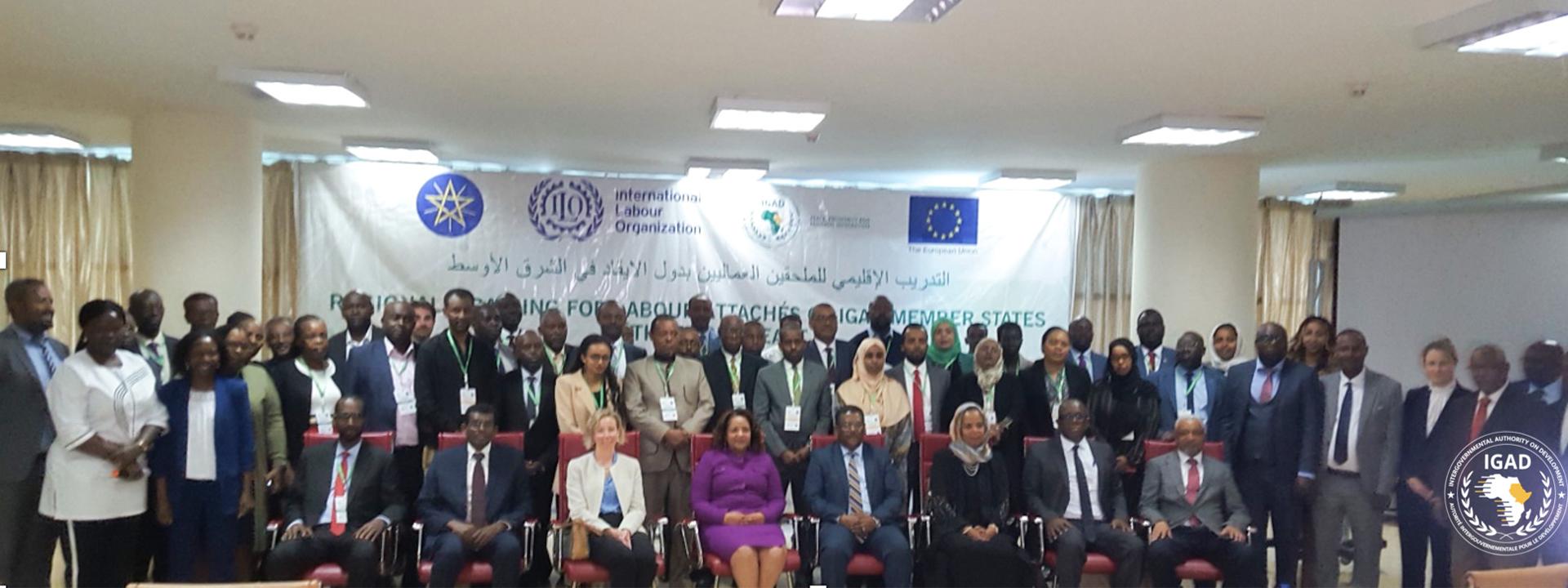November 21, 2022, (ADDIS ABABA, Ethiopia): The Intergovernmental Authority on Development (IGAD) and International Labour Organization (ILO) launched a first regional Training Workshop on Improving Capacities of Labour Attachés and Embassy Officials Working on Labour Migration Governance in the IGAD Region.
The overall objective of the five days training is to improve capacities of labour attachés and consular and Ministry of Foreign Affairs (MoFA) officials assuming this function for IGAD Member States to improve labour migration governance and protection of migrant workers in the Middle East.
On his opening remarks, Mr. Nigussu Tilahun State Minister, Ministry of Labour and Skills of F.D.R of Ethiopia disclosed that Ethiopia is gradually embarking on the process, in context where around 2 million youth are joining labour market every year, which makes generating adequate employment opportunities in the country a challenge.
“In order to realize the full potential from the migrant workers; priority should be given to their empowerment and protection from the unfair practices and right abuses in the migration cycle.” He stressed.
Representative of the Government of Republic of the Sudan, IGAD Chair, Ambassador Abdulhafiz Elawad said that as IGAD countries, we are grateful for the technical assistance of ILO and financial support from EU in the process of organizing this regional training aimed at improving the capacities of the labour attaches’ of IGAD Member States working in the Middle East.
Speaking on behalf of the Executive Secretary of IGAD, H.E. Dr. Workneh Gebeyehu, the Director of Health and Social Development Division, Madam Fathia Alwan, said that Migrant workers contribution to the economic development of countries of origin and destination through their competencies, skills and experienceis receiving growing recognition and the increasing migration flows to the Middle East is becoming an important source of remittances/ Foreign Currency for the IGAD Member States.
“It is vital to enhance the capacities of Labour attachés of IGAD Member States in the Middle East that are engaged in the labour migration governance to improve the working conditions and protection of migrant workers in the countries of destination.” The Director added.
Mr. Alexio Musindo, Director, ILO Country Office for the Federal Republic of Ethiopia, Djibouti, Somalia, South Sudan and the Sudan explained that the training focuses on labour migration dynamics and challenges, international normative and policy frameworks and their role in addressing abusive and exploitative labour migration practices as well as providing much needed support to migrant workers.
“I would like to take this opportunity to appreciate the IGAD Secretariat for our continued partnership in advancing labour migration governance in general and organizing this noble training to address plethora of issues around migrant workers in the countries of destination in particular.” He added
On her remarks Mrs. Birtukan Ayano, State Minister, Ministry of Foreign Affairs of the Federal Democratic Republic of Ethiopia disclosed that the issue of protection of migrant workers is of high concern for the government, the more so where the majority of them are employed in low-skilled occupations and often exposed to various kinds of abuses.
“The role of labour attachés proves to be significant. The need to strengthen the capacity of labour attachés, both in number and skill has been given due attention by the Government, and we will work towards materializing this plan in the foreseeable future.” The state Minster stated.
Mrs. Sabirana Bazzanella, Team leader of EU Delegation in Ethiopia also gave her remarks.
A Regional training brought together participants from labour attachés of IGAD Member States in the Middle East, representatives of Ministry of Foreign Affairs (MoFA), Directorates for Middle East affairs of IGAD Member States and the embassy or consulate focal persons working on protection of migrant workers.
The training is expected to improve the knowledge, understanding and skills of the participants to provide protection services for migrant workers and establish a professional network to share information and experiences in the future.
The International Convention on the Protection of the Rights of All Migrant Workers and Members of Their Families in 1990; the Convention on the Elimination of all Forms of Discrimination Against Women in 2008: 10; Guideline 12.8 of the ILO Multilateral Framework on Labour Migration in 2006; the AU Migration Policy Framework for Africa in 2018; the Nairobi Process on “Harmonizing Labour Migration Policies in East and Horn of Africa in January 2020; and the Djibouti Declaration on Labour, Employment and Labour Migration in October 2021 respectively are the existing instruments at global, continental and regional levels related to labour migration and protection of migrant workers.

